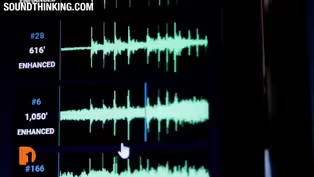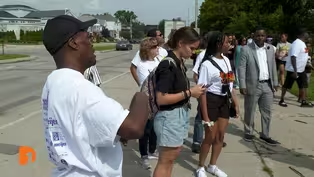
Focus: HOPE expands seniors food program with 43 new sites
Clip: Season 8 Episode 7 | 6m 31sVideo has Closed Captions
The Food for Seniors program provides food boxes to senior citizens 60 years and older.
Focus: HOPE has expanded its Food for Seniors program to assist more seniors who are experiencing food insecurity. Program expansions include the addition of 43 new sites across Southeast Michigan where eligible seniors can register for monthly food boxes. Focus: HOPE's Food Program Director Frank Kubik talks about the expansions and the national issue of seniors needing food assistance.
Problems playing video? | Closed Captioning Feedback
Problems playing video? | Closed Captioning Feedback
One Detroit is a local public television program presented by Detroit PBS

Focus: HOPE expands seniors food program with 43 new sites
Clip: Season 8 Episode 7 | 6m 31sVideo has Closed Captions
Focus: HOPE has expanded its Food for Seniors program to assist more seniors who are experiencing food insecurity. Program expansions include the addition of 43 new sites across Southeast Michigan where eligible seniors can register for monthly food boxes. Focus: HOPE's Food Program Director Frank Kubik talks about the expansions and the national issue of seniors needing food assistance.
Problems playing video? | Closed Captioning Feedback
How to Watch One Detroit
One Detroit is available to stream on pbs.org and the free PBS App, available on iPhone, Apple TV, Android TV, Android smartphones, Amazon Fire TV, Amazon Fire Tablet, Roku, Samsung Smart TV, and Vizio.
Providing Support for PBS.org
Learn Moreabout PBS online sponsorship(upbeat music) - So tell me about Food For Seniors, which is this program that you're expanding, but also tell me about the current climate for hunger and food scarcity right now and how different it looks.
I imagine that that has a lot to do with the decision to make this available to more people in in the metro area.
- Exactly.
We have the Commodity Supplemental Food Program here at Focus Hope.
It's a national program funded by USDA.
It's for low income seniors who are 60 and over and have a monthly income of $1,580 a month or less.
So you get a nutrition balanced food box.
The nutritionist at USDA put the package together, canned fruit, meat, juice, vegetables, cheese, pasta, peanut butter, beans, et cetera.
It's meant to supplement what you already have.
And what we're seeing with a lot of seniors is unfortunately this is not a supplement.
It's more of almost a majority of the food that they have each month.
So it's difficult for seniors.
And with the rising number of seniors who are food insecure, you've got, you know, 7%, 7.1 million, I'm sorry, of seniors in this country are food insecure.
These seniors have worked all their lives, they've contributed so much to this country and make it the country it is today.
But many of them work at low paying jobs where jobs didn't record their earnings.
So when you look at a social security statement each month, like they really don't get a true value of what they put into this country.
And hearing your golden years, you shouldn't have to worry about where your next meal's coming from.
So programs like this that are senior only programs to USDA, they were geared to the seniors who needed a boost in their food, their balanced food.
And it's just balanced food to keep them healthy.
This is a great program for them.
What we've seen with the need is this growing, and this is again the fastest rising group of hungry in this country is that there's so many seniors are isolated and homebound.
And the challenge we have is reaching those seniors.
And I think that challenge is the same whether it's in Detroit, Los Angeles, New York, Dallas, Alaska.
I was at a national conference and we heard about Alaska and some of the challenges they faced and I think, man, I have to worry about getting from one side of town to the other.
And they cross rivers to get food to seniors.
So the program operators are really dedicated to get this food to seniors.
So it's important now.
We see the cost of everything going up.
I wouldn't get my oil changed.
I was shocked at what that was the last time.
Look, if you're living on a fixed income, you've got you utility cost, putting gas in your car, if you have a car, paying for other food, again, this is a supplemental amount of food.
It's not meant to carry you through the whole month.
Your medical costs, your home repairs.
You go to so many homes, what do you see?
A leaky roof.
I mean there's so many things that a senior has to deal with and on a fixed income, programs like this are just super important.
- 43 new sites throughout Metro Detroit and we should stress it's Metro Detroit.
People think of poverty and they almost always think of Detroit.
And that's true.
We do have an acute problem with poverty and food insecurity and housing insecurity and all those things here.
But that's true increasingly in other communities, and to an even greater extent than in the past.
- And I think what we've seen, we cover Wayne, Oakland, and Washtenaw counties.
There's not a sign that says "End of Hunger when you cross Eight Mile."
That need extends beyond Eight Mile.
I think 10% of the seniors in our metropolitan area are food insecure.
So we have to get out to those seniors, as we've mentioned with the limited resources, and just the fact it's hard for seniors to get out.
We have to get to Rochester.
I can't have a site here on Oakland Boulevard and say, okay from Ann Arbor, come and get it.
Mount Clements, here we are.
It doesn't work that way.
So it's up to us to make sure that we get on those communities.
So now we're reaching out to, we're in Utica, we're in Rochester, Ann Arbor, Roseville, Ypsilanti, our whole service area, we're getting more sites.
So when you hear about the additional sites that we've added to our program, we're looking to even add more because what we don't want is someone not to be able to get the food that they need.
So it's on us to make sure we get that food too then.
- It's also a reminder, I think during the pandemic, I think we were all made much more aware of the needs that exist and they were made worse during the pandemic.
And I think people really stepped up in ways that they hadn't before to try to make sure that the folks could get through.
Now we're at least talking about being in post-pandemic, but those needs don't really go away for everyone.
And the awareness that the pandemic raised for all of us, I think we gotta maintain that.
We have to stay in that space and understand that there are folks who all the time are gonna need help.
- And pandemic brought it home, I think to a lot of us, and there is no normal anymore.
The normal is not to be normal, I suppose.
And what we had to do to adapt to the pandemic in terms of even serving the seniors, we went from a system where you would come into our sites and pick up food to one where you'd pull up in front and open your trunk and we put it in there.
And so the things that happened then have not gone away.
The seniors are not become instantly hunger issue was gone away just like around the holidays when you see an uptick in folks that are volunteering and helping and we appreciate that, it means so much, especially that time of year, but it doesn't stop on January 1st.
And so now that we're out of the pandemic, hunger hasn't stopped.
And I think the awareness that has created the people were stepping up and helping their neighbors and their friends and their communities and their families.
We tell folks, look at those who are closest to you because sometimes we don't see it, that the people that are closest to us are the ones that are most in need.
So that hasn't gone away.
But the awareness that the pandemic did bring to the issue of hunger, we wanna make sure that people don't forget about that and keep doing the things they need to do.
So we take care of our seniors.
Detroiters raise concerns about city’s ShotSpotter expansion
Video has Closed Captions
Clip: S8 Ep7 | 6m 5s | Controversy surrounding Detroit’s ShotSpotter expansion raises concerns among residents. (6m 5s)
One Detroit Weekend: August 18, 2023
Video has Closed Captions
Clip: S8 Ep7 | 2m 29s | Cecelia Sharpe and Peter Whorf share what you can do around Detroit this weekend. (2m 29s)
Peace & Prosperity Youth Action Movement promotes leadership
Video has Closed Captions
Clip: S8 Ep7 | 6m 34s | Peace & Prosperity Youth Action Movement promotes youth leadership at Neighborhoods Day. (6m 34s)
Providing Support for PBS.org
Learn Moreabout PBS online sponsorship
- News and Public Affairs

Top journalists deliver compelling original analysis of the hour's headlines.

- News and Public Affairs

FRONTLINE is investigative journalism that questions, explains and changes our world.












Support for PBS provided by:
One Detroit is a local public television program presented by Detroit PBS


